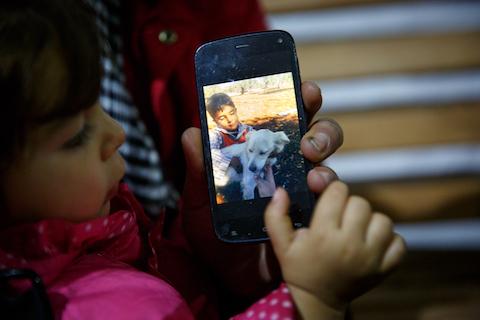- FCC's Win Cements Obama's Internet Legacy - Nancy Scola and Alex Byers (Politico)
- The Net Neutrality Court Decision, in Plain English - Brian Fung (Washington Post)
- Comcast-Funded Website Plugs Comcast-Owned TV Show Promoting Comcast-Backed Trade Pact - Adam Johnson (FAIR)
- AP’s Clinton ‘Victory’ Story Breaches Journalism Ethics and Public Trust - Bill Boyarsky (Truthdig)
- How Technology is Affecting the Refugee Crisis - Alyssa Cogan (MercyCorps)
FCC's Win Cements Obama's Internet Legacy
By Nancy Scola and Alex Byers
June 14, 2016
Politico
With a federal court upholding his administration’s sweeping net neutrality rules on Tuesday, President Barack Obama is poised to fulfill a promise he made when he first ran for the White House — to use the power of the office to keep the internet a “level playing field” for everyone.
The FCC has declared it will ensure equal footing for everyone from high-school coders to the giants of Silicon Valley. The aim: to guarantee every internet user has the chance to speak freely online and shake up the digital economy just as Netflix and Amazon once did.
The losers of the debate include internet service providers like AT&T, which have argued that the rules amount to government interference that will chill innovation on the networks they build and maintain.
Note from Moderator NR : This is one of the most important legal decisions of the internet age – affirming that access to the internet is “not a luxury but an essential public utility” to not be left unregulated as a private, commercial enterprise, but must be egalitarian in access and bound by rules of fairness in pricing.
The battle isn’t over – it is certain Big Media and Big Telcoms will appeal. But this is a big victory for the Civil Rights, Consumer advocates and Media Justice movements defending the FCC and providing a critical legal justification for organizing on behalf of progressive media and technology policy.
The Net Neutrality Court Decision, in Plain English
By Brian Fung
June 15, 2016
Washington Post
A federal appeals court said that the Internet is basically like a giant telephone network and that the companies that provide it, such as Comcast and Verizon, must offer essentially the same protections to Internet users that the government has required of phone companies for decades.
Okay, that description glosses over some details that we'll try to explain below, but the big thing here is that this court ruling represents one of the most important moments in the history of the Internet. It reflects a change in understanding that, if upheld, will now shape everything ranging from how Internet service providers (ISPs) upgrade their networks to what apps you can find on the Web. The weirdest thing is, you'll probably never even notice.
Comcast-Funded Website Plugs Comcast-Owned TV Show Promoting Comcast-Backed Trade Pact
By Adam Johnson
June 11, 2016
FAIR
News “explainer” Vox (6/10/16) ran a seemingly innocuous write-up on Friday of President Barack Obama appearing on NBC’s Tonight Show Starring Jimmy Fallon the night before, “slow jamming” the benefits of the highly controversial Trans-Pacific Partnership: “Watch: President Obama Sings Rihanna With Jimmy Fallon to Explain the Importance of the TPP.”
It would be funny if it weren’t a borderline parody of everything wrong with corporate-owned “new media”: What we have here is a Comcast-funded website plugging a Comcast–owned TV show to promote a trade deal aggressively lobbied for by Comcast.
AP’s Clinton ‘Victory’ Story Breaches Journalism Ethics and Public Trust
By Bill Boyarsky
June 9, 2016
Truthdig
The Associated Press’ early crowning of Hillary Clinton as the “presumptive” Democratic presidential nominee thrust a news organization into the middle of the political process with a story that suddenly, and without enough explanation, emerged from the mysterious methods of today’s journalism.
From the beginning, I wondered how AP got the story and why it was put out just before Tuesday’s primary. The superdelegates are, to a great extent, party powers—governors, lawmakers and others. From the beginning, they figured to be in the bag for Clinton. It was enterprising to contact them to confirm this. But why run the story at that crucial moment? What was the news organization thinking? Did AP consider the impact on the election?
How Technology is Affecting the Refugee Crisis
By Alyssa Cogan
June 9, 2016
MercyCorps
Smartphones, Wi-Fi hotspots and other technologies help refugees communicate, find information and stay safe. And instead of a paid mobile subscription, free applications like Facebook, Viber, WhatsApp and MAPS.ME make it possible.
“Wi-Fi tends to be the first thing people ask for once they arrive and get into dry clothing,” says Andrea Dillon, a Mercy Corps staffer in Greece. Our team there reports nearly every group of refugees that arrives has at least one smartphone — and one person who knows how to use it — among them.
Upon connecting, Dillon says most refugees’ immediately use social media to let their loved ones know they have arrived safely. Others contact family and friends who have made the journey ahead of them to get information on what to expect next.


Spread the word